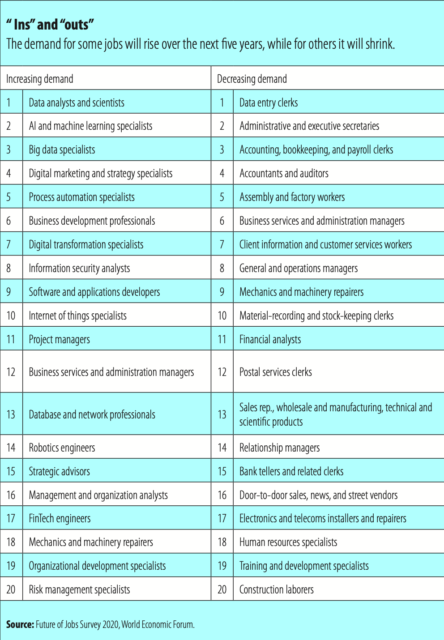Around this time last year, millions of people across the world started losing their jobs due to the COVID-19 crisis.
The good news is that countries with robust economies like the US have recovered, but we still have a long way to go before confidently saying that things are back to normal.
For some people, the job they used to do may not be there for them to come back to. This could be the result of the challenges brought on by the pandemic or automation.
According to the World Economic Forum, remote work is here to stay, and automation is growing faster than anyone expected. However, this is nothing new. Today we are going to try and predict what the jobs of the future will be.
The Way We Work has Changed Again and Again for Centuries
It happened before and will undoubtedly happen again. For example, the production of stockings was revolutionized by mechanization in the 16th century.
In the 19th century, steam-powered machines optimized mills and factories and surpassed the output of products previously hand-crafted by artisan workers.
The same happened just four decades ago when robotics entered the automotive industry. In this scenario, robots took over assembly-line tasks such as spray painting and welding.
Not everyone was happy, but life moved on. It didn’t lead to unemployment. Instead, it shifted humans into a supervisory role. Going forward, we can expect something similar. But what are the new jobs of the future, and how can you prepare for the change?
What Jobs Are at Risk of Automation?
If you’ve been worried about the future of your job in the age of AI, the research suggests that more jobs will be created over the next few years than those lost to automation. According to the International Monetary Fund (IMF), robotics and automation will create 97 million new jobs.
However, it’s also vital to note that the workforce (in general) is at risk of widespread more than in other areas. The time humans and machines spend on tasks at work is forecasted to be equal by 2025, which may already give you some idea of what jobs of the future in 2025 will look like.
According to the IMF and the World Economic Forum, jobs like data entry clerks, administrative secretaries, and payroll clerks (and more) will become increasingly obsolete.
Simultaneously, there will be significant demand for jobs like data analysts and scientists, Artificial Intelligence (AI) and Machine Learning (ML) specialists, and big data specialists (and so on), making those some of the best blue-collar jobs of the future.

Businesses that want to remain competitive will concentrate on upskilling their workers. Of the others set to keep their current roles, almost half will be required to retrain their core skills over the next five years. This means that you won’t lose your job, but you’ll indeed have to learn new tricks to account for the impact of AI and the future of jobs.
The public sector also needs to provide robust support to encourage reskilling and upskilling. This is because not every business can afford to reskill or upskill at-risk or displaced workers. This could take the form of incentives like tax breaks and more.
While the last few paragraphs above may give you some cause for concern, it really shouldn’t. At least, not yet.
The Long Road Ahead
According to PricewaterhouseCoopers (PwC), machines, including various forms of automation, have the potential to contribute as much as $15 trillion to global GDP by 2030. This additional wealth will help generate the demand for many new jobs (while displacing a few old ones).
The analysts at PwC believe that automation at the workplace will come in three waves over the next 20 years:
- Wave 1: algorithmic (in the early 2020s)
- Wave 2: augmentation (in the latter half of the 2020s)
- Wave 3: autonomy (from early to mid-2030s)
PwC forecasts a relatively low displacement of existing jobs, just 3% over the next couple of years. However, as automation technologies and supporting infrastructure mature, job displacement could rise drastically, changing jobs of the future by 2030.

In about 15 years, up to 30% could be automated. This scenario might affect males who engage in manual tasks (like truck driving) for a living. In the second wave, more women are at risk of displacement as females make up the majority of clerical and administrative workers, which makes the prospect of the jobs of the future in 2050 a bit frightening to some people.
In the short term, industries like financial services may see the most disruption as algorithms are more accurate, efficient, and fast when it comes to analysis and assessments. In the long term, the transportation industry will see the most changes, with autonomous driverless vehicles replacing humans on a large scale.
In contrast, healthcare will probably be the least affected. This is because there’s a greater reliance on social skills and (of course) the human touch. AI and robots will likely work together with humans rather than replace doctors and nurses. It’ll be more or less the same in the education sector.
So, what are the jobs of the future? It is important to note here that these types of changes happen from time to time. While there might be some resistance, humans have always adapted and kept working regardless of the challenges they faced in the beginning.
In the same vein, AI and robotics will revolutionize how we work, but they won’t make us mortals obsolete. Instead, the challenges posed by these machines and algorithms will make us better, free us to do more meaningful work, and dominate the fourth industrial revolution.
Do you need help automating mundane tasks to enhance productivity and boost your bottom line? Schedule a commitment-free consultation now.






